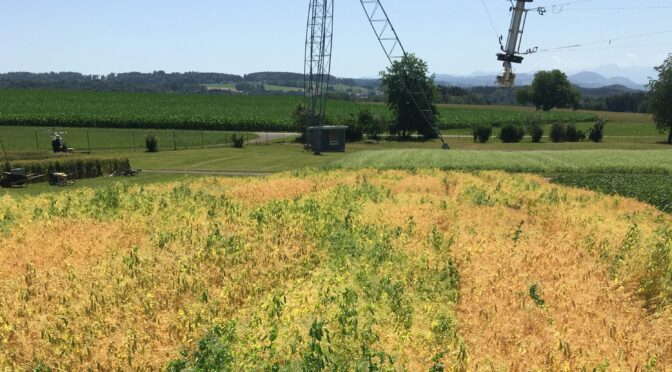By Beat Keller, Crop Science at ETH Zurich
The Swiss agriculture is traditionally focused on meat and dairy production. Yet, global warming requires agricultural practices to radically change: without decreasing livestock production, there is no sustainable solution for food production (about 85% of the Swiss agricultural emissions originate from livestock production). Fortunately, the Swiss population is consuming more and more plant-based proteins substituting animal products.
There is increasing demand for legume species such as soybean, faba bean and peas. However, adapted legume varieties for human consumption, local production and supply lines are largely missing. Only soybean has established supply chains and modern varieties thanks to the foreseeing breeding program of Agroscope which started decades ago.
Increasing plant-based proteins has three main advantages: First, legumes have a healthy effect on our diet and following the health guidelines of the BLV[1], meat consumption should be decreased by 66% on average.
Second, the footprint of legume production is low because of the ability of grain legumes to biologically fix nitrogen from the air allowing to dwarf nitrogen fertilization.
Third, producing legumes is an opportunity for Swiss farmers to enter new markets and diversify their products. Switzerland has the potential to provide plant-based alternatives which can be also economically interesting. This view point was confirmed by a survey of 29 experts. In a recent study (not yet peer-reviewed), we estimated that an area of about 100,000 ha land is suitable for legume production in Switzerland using geographic information system tools (not yet peer-reviewed[2]). Major areas for leys (grassland on arable land) and fodder maize production could be used to grow legumes while keeping the meadows (permanent grassland) for cows. About 35% of the consumed animal proteins – mainly meat from pigs, cattles and cows and milk – could be replaced by ~70,000 t of grain legume proteins produced by Swiss farmers per year. The decrease in animal production and increase in protein production also allows to stop soybean imports (~300,000 t per year) and the import of other concentrated feed (again ~300,000 t per year) and, hence, increase the self-sufficiency of Swiss agriculture.
To support legume production, the Crop Science group of ETH Zurich collaborate with Agroscope and Getreidezüchtung Peter Kunz (GZPK) to quickly adapt soybean and pea varieties to the needs of Swiss producers and food manufacturers.
At our field site in Eschikon, we can monitor plant growth using the field phenotyping platform (FIP). Based on high-resolution RGB cameras, we can follow ten to hundreds of varieties over the growing periods. This allows us to identify and select superior varieties tolerant to different climatic conditions. We also study the development of the plants, their seeds and protein content and which environmental factors influence this development. With an effort of science, agriculture, politics and the food industry, the growing market demand of plant-based proteins can be meet by Swiss products. By assisting legume breeding, we aim to support Swiss agriculture on its path toward more sustainability.
Dr. Beat Keller (ETH Crop Science) works as Post-doc on legumes and their improvement for human nutrition and adaptation to the future Swiss climate.
Image by Isabelle Reichlin
[1]Federal Office of Food Safety and Veterinary (BLV): https://www.aktionsplanernaehrung.ch

